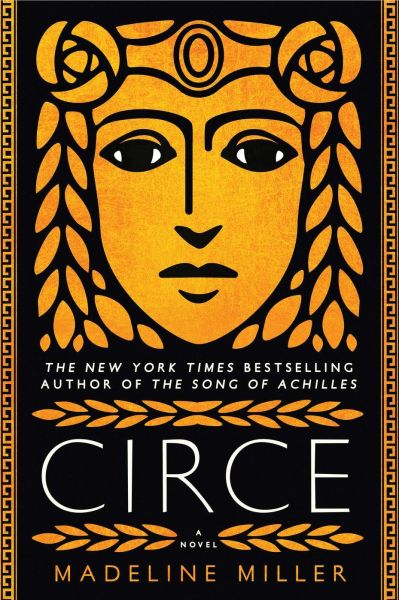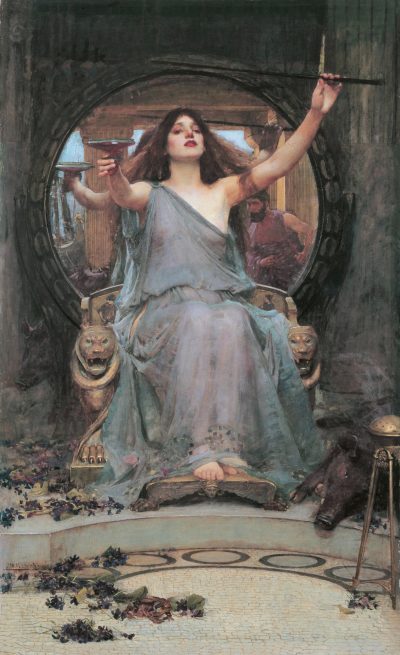Dancing Shadows and Firelight
Circe
By Madeline Miller

16 Jun, 2020
Madeline Miller’s 2018 Circe is a retelling of Greek myth.
Titan Helios is a god; his wife Perse is a naiad, a water nymph. Their daughter Circe is immortal but otherwise unremarkable for beauty or supernatural powers. Her parents don’t see much hope that she will make a good marriage. Her father prophesies that she will have settle for a mere mortal.
But there is more to Circe than the gods first perceive.
Another naiad, Scylla, is a bully who torments Circe. One day, pressed too far, Circe lashes out at Scylla and turns her into a hideous sea monster. It seems that Circe and her siblings (Perses, Pasiphaë, Aeëtes) aren’t mere demi-gods. They are something new: witches.
The gods do not value novelty, especially when the novelty is dangerous. But rather than incinerate Circe and her siblings with a lightning bolt, Zeus, in consultation with Circe’s father Helios, decides to exile Circe to a distant island. Her siblings are deemed no threat and Circe is a convenient scapegoat.
Circe doesn’t find exile a punishment. She’s free of her relatives and can cultivate her talents as she pleases. She has all the time in the world to hone her skills, as she’s immortal. Her supposedly isolated island proves to be something of a Mediterranean crossroads. Heroes and gods set foot on Circe’s domain, with various results, not all of them nice.
~oOo~
The author has multiple degrees in the classics, and it shows1. There’s far more depth here than one would get from the usual texts fobbed off on people with a passing interest in classical myth. [Note: classics and classical by Western standards.]
The Greek gods are, on the whole, terrible people but then, so are many of the mortals who appear in Greek myths. Most of the myths aren’t comforting moral tales. Perhaps you didn’t have the delightful experience of being overdosed with Greek myths in school2? Then trust me: the gods are unfamiliar with the concept of “consent” and have the will and the means of carrying out spectacular vengeances.
Strangely enough, the people of the classical world lived in a world filled with gods and monsters, a world where a moment of ill-chosen disrespect can bring down cataclysmic fury, but they seem to have been terrible at reading the room, forever discovering too late that they have angered someone who should never be angered. Perhaps in Circe’s case, it is because her manner is so demure and reassuring.

Circe’s role in the myths, as I recall, is to facilitate other people’s stories. Miller provides Circe’s perspective, filling in the details of who she is and why she does what she does. It would have been easy enough, given the way Circe was depicted in myth, to create a Circle who is vengeance-driven and cruel. Miller shows us a Circe who is alienated but also capable of compassion.
Miller’s Song of Achilles won the Orange Prize for Fiction in 2012. I didn’t read it then, so this is the first Miller novel I have encountered. (Other people were selecting my reading material for me back then; I missed some good stuff.) I quite enjoyed Miller’s deft prose and plotting, as well as her artful reworking of familiar myths. Clearly Song of Achilles is somewhere in my future.
Circe is available here (Amazon US), here (Amazon Canada), here (Amazon UK), here (Barnes & Noble), here (Book Depository),
1: Among other degrees and courses of study. To quote her bio:
She has also studied at the University of Chicago’s Committee on Social Thought, and in the Dramaturgy department at Yale School of Drama, where she focused on the adaptation of classical texts to modern forms.
The bio also notes that “she has taught and tutored Latin, Greek, and Shakespeare to high school students for over fifteen years.” Lucky kids!
2: In retrospect, it’s weird that my rural high school, where bringing in an actual non-Christian to discuss their religion in world religions class was deemed too controversial, had no problem feeding us as much Greek legend as we could swallow. [Editor’s note: hangover from the 19th century (and earlier) British notion of a proper upper-class education, which featured the learning of Latin and an immersion in Greek and Roman literature.]
